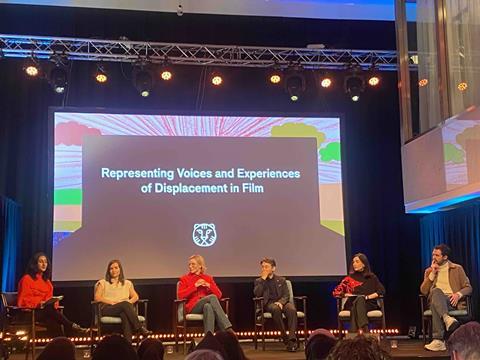
Cate Blanchett has shed more light on the Displacement Film Fund, a new €500,000 short film grant scheme to support refugee filmmakers to tell their stories.
Blanchett is chairing the selection committee of the Fund which was officially launched in collaboration with the Hubert Bals Film Fund at the Rotterdam international Film Festival (IFFR) on Saturday (February 1). It offers up to five individual grants of €100,000 for up to five displaced filmmakers, or filmmakers with a track record in creating authentic storytelling on the experiences of displaced people.
IFFR managing director Clare Stewart described Blanchett, who is a goodwill ambassador for the UN’s refugee agency UNHCR, as “the driving force” behind the initiative.
Speaking at IFFR, Blanchett noted the number of displaced people worldwide is now around 120 million, the same as the population of Japan. “I find it bewildering, I think we all do, about how vast and urgent this situation is. Yet these stories don’t seem to be getting into the mainstream.”
Blanchett said the “very human” reality of displacement has been “politicised and made toxic and somehow been kept off our screens.”
One of the main reasons the fund is backing short films, rather than features, is they allow displaced filmmakers to bring their projects to screen relatively quickly compared to features. Blanchett also said shorts “can have a social impact that then can be expanded into being something else.”
Blanchett said the challenges facing the wider film industry gave added relevance to the fund. “We’re releasing this fund at a really turbulent and potentially exciting time when audiences are hungry for consuming story in many different ways. Also, the industry is, in a lot of ways, in free fall, and that’s an opportunity to reforge itself into something more exciting as well.”
Blanchett added: “Oftentimes a feature film can get into quite a conservative formulae. When you start talking about more money, then there’s more pressure on it to be a certain thing. Often the dreaded three act structure can squeeze all the creativity, vitality, adventurousness and ground breaking quality out of a feature whereas a short… is actually a place where [a filmmaker] can truly experiment. The audience member is also thinking, “You’re not asking a lot of my time necessarily. I’m prepared to go with you in places I may not otherwise in a feature film.”
Official launch
Blanchett appeared on a panel at IFFR to launch the fund alongside Koji Yanai (Perfect Days), Waad Al Kateab (For Sama), Jonas Rasmussen (Flee) and HBF head Tamara Tatishvili.
Tatishvili said the Displacement Fund builds on the legacy of HBF’s in supporting filmmakers from countries where production infrastructure is lacking or the freedom of expression is really hindered.
She said it would run as a pilot in its first year. “We are very pragmatic and realistic partners here. We know that when we set up a new structure, we need to also learn from it – and there will be learnings and outcomes that will help us to move this fund into a legacy fund.”
The Displacement Film Fund was first initiated and developed at UNHCR’s Global Refugee Forum by Blanchett and fellow UNHCR supporters Ke Huy Quan (Everything Everywhere All At Once), and his wife Echo Quan, healthcare exec Ayman Tamer, Koji Yanai (Perfect Days), and investor Isaac Kwaku Fokuo.
Blanchett recalled: “We were talking about how refugees, asylum seekers and people who are displaced often feel invisible, and how could we make their stories more visible…You don’t stop becoming a filmmaker just because you’re displaced. Yet your stories and your career are put on hold.”
The new fund’s selection committee also includes For Sama director Waad Al Kateab, Wicked star Cynthia Erivo, Green Border director Agnieszka Holland, IFFR festival director Vanja Kaludjercic, educator, activist and refugee Aisha Khurram, Flee director Jonas Poher Rasmussen, and Amin Nawabi [alias], an LGBTQ+ asylum seeker who is Jonas’ inspiration for the story of Flee. The five finished projects will have their world premieres at IFFR 2026.
Al Kateab, who was displaced by the Syrian Civil War, recalled the challenge of making For Sama, about the siege of Aleppo, which went on to win a best documentary Bafta and to be Oscar nominated. “For me, it was very important - it was about survival for me. I wanted people to understand. I wanted to live. I wanted to accept what happened in telling this story. When the film was out, and people came to watch it, I saw how it really changed people’s minds and hearts. It made me more visible. It made the story of so many people like me feel that it’s visible.”

























No comments yet